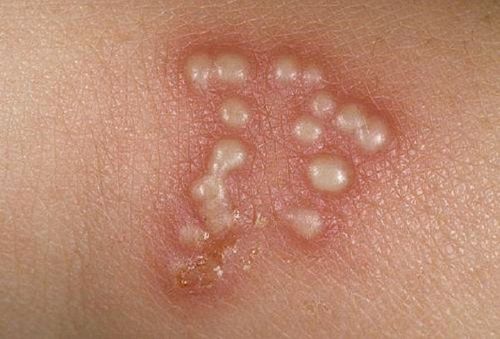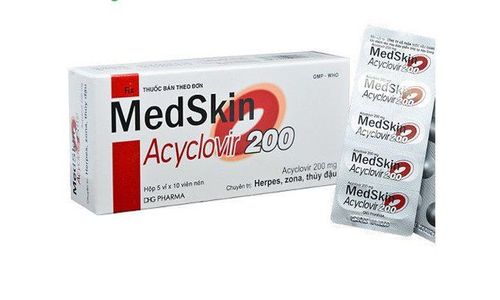This is an automatically translated article.
Herpes viruses are a large family of viruses that can cause skin infections, affecting many organs of the body. Herpes virus is highly contagious, so avoid contact, kiss or have sex with someone who is sick to prevent infection.
1. What is Herpes Virus (HSV)?
Herpes virus is a very large family of viruses that have the ability to self-replicate when attacking cells. This virus usually causes infections in the eyes, tongue, throat, lips, genitals, and other parts of the body.
Herpes viruses, when entering host cells, will cause symptoms of skin infections, ulcers or damage to cell structures. Herpes HSV virus can cause illness in all people regardless of gender and age. However, this virus can lead to severe infections in infants and can lead to serious complications.
Herpes virus agents include:
Herpes simplex virus of the family Herpesviridae. Herpes simplex virus HSV or Human herpes virus (HHV) is divided into 3 groups: Alpha herpes virinae; Beta herpes virinae; Gamma herpes virinae.

Mụn rộp sinh dục do virus HSV gây ra
Modes of transmission of the HSV virus include:
HSV-1 can be transmitted through: Sharing eating utensils; Kissing; sharing personal items such as towels, brushes; coming into contact with the secretions of herpes sores from someone who has or could get genital herpes from HSV-1 if they have had oral sex with sores during that time. HSV-2 is transmitted mainly through sexual contact with someone who has HSV-2. Specifically: Having unprotected sex with a condom or other safe method; having sex at a young age; have many sexual partners; women are often more susceptible to infection than men; people who have a sexually transmitted infection or have a weakened immune system.
2. Herpes Virus (HSV) Diseases
Some diseases caused by the Herpes HSV virus include:
Genital herpes : This is a sexually transmitted disease, caused by the Herpes Simplex virus 1 or 2. Two viruses that enter the body through mucous membranes and is commonly found in the nose, mouth, and genitals. The disease is spread to others through contact with saliva, semen, and vaginal secretions. The virus can cause blisters on the penis, scrotum, vagina, anus, mouth, and lips.

virus Herpes Simplex 1 gây ra mụn rộp sinh dục
Congenital Herpes : This is an infection of the Herpes virus in a newborn while in the mother's womb. This condition is rare, but can lead to systemic skin infections in infants; brain damage; shortness of breath, other breathing disorders; convulsions; kidney and liver dysfunction... The treatment only prevents complications, relieves symptoms, and Herpes virus will persist in the body for life.
Keratitis : Keratitis is a condition caused by recurrent Herpes virus. The infection can occur elsewhere in the body, then the infection travels along the nerves and travels to the cornea with symptoms of swelling of the cornea, swelling of the eyelids and accompanied by minor lesions such as itchy eyes and cornea. .
Infectious mononucleosis: Disease caused by the Epstein-Barr virus. The disease is common in children and young adults. Symptoms include fever, sore throat, and swollen lymph nodes in the neck.
3. General symptoms caused by Herpes virus (HSV)
Symptoms include:
Body fatigue, loss of appetite, swollen lymph nodes nearby. The location of the herpes virus infection, the patient feels a burning pain before the blisters appear. Vesicles or pustules about the size of a sheet or sesame seed, concave in the middle, clustered like a bunch of grapes. Blisters break open to form scuffs that then scab over.
4. Prevention of Herpes Virus (HSV)

Quan hệ tình dục an toàn là cách tốt nhất giúp phòng tránh mụn rộp sinh dục
To prevent diseases caused by Herpes virus, everyone needs to be proactive:
Safe sex: Have a healthy sex life; monogamy helps to reduce the risk of genital herpes and other dangerous sexually transmitted diseases; Use safe sex methods such as condoms. Do not share personal items: These are items with high potential for causing dangerous infectious diseases, including those caused by the Herpes virus. Keeping the intimate area clean, using benign cleaning solutions, should not wear tight, tight clothes, wet underwear, to help reduce the risk of disease. Eat right, rest, relax properly, in addition, increase exercise to keep the body healthy. It is recommended to have regular health check-ups every 6 months, to detect diseases and treat them promptly. People with HSV-2 should avoid any type of sexual activity with others during an outbreak. If a person has no symptoms but has been diagnosed with a viral infection, a condom should be used during intercourse. But even when using a condom, the virus can still be transmitted to a sexual partner from unprotected skin. Pregnant and infected women need to go to medical facilities for examination and advice on how to prevent the virus from infecting the fetus. Vinmec International General Hospital is one of the hospitals that not only ensures professional quality with a team of leading doctors, modern equipment and technology, but also stands out for its examination and consulting services. and comprehensive, professional medical treatment; civilized, polite, safe and sterile medical examination and treatment space.
Please dial HOTLINE for more information or register for an appointment HERE. Download MyVinmec app to make appointments faster and to manage your bookings easily.













